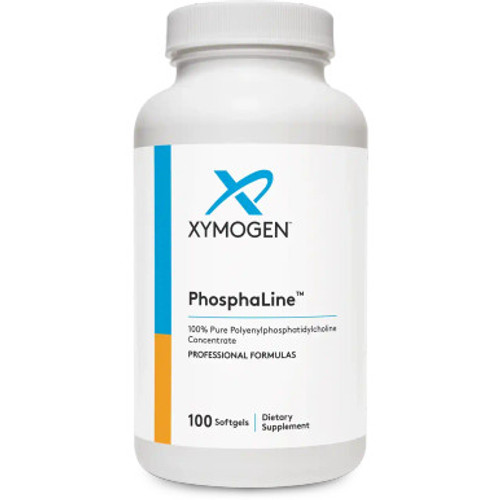PhosphaLine 100 sg by Xymogen
PhosphaLine 100 sg by Xymogen is designed to support and protect cell membranes with a highly bioactive ingredient, polyenylphosphatidylcholine (PPC), which makes up over 50% of cell membranes.* This ingredient plays a crucial role in the fluidity and elasticity of cell membranes, and is essential for detoxification, liver function, and cellular regeneration.* PhosphaLine supports a healthy nervous system, cardiovascular health, and gallbladder function, while also protecting key cells like hepatocytes, pancreatic beta cells, and gastric mucosa.* Unlike other phosphatidylcholine supplements, PhosphaLine contains over 50% of pure 1,2-dilinoleoylphosphatidylcholine for optimal membrane strength, fluidity, and quality, ensuring the protection and function of intracellular organelles.* PhosphaLine 100 aids in inflammation regulation and immune processes to support overall health and wellness.*
Who Should Consider PhosphaLine 100 sg by Xymogen?
PhosphaLine 100 sg may support your health if you:
- have liver problems or want to support detoxification*
- want to support cellular regeneration, and protect vital cells*
- have inflammation*
- want to support your immune system*
PhosphaLine 100 sg by Xymogen—Effects?
PhosphaLine 100 sg may:
- improve cellular health and detoxification*
- promotes a healthy nervous system and cardiovascular health*
- support immune processes, and help regulate inflammation*
Supplements support your health but do not replace a balanced diet. Always check with your healthcare practitioner if you have doubts about a new supplement. Book a FREE product consultation to learn more about PhosphaLine 100 sg by Xymogen.
Recommendation:
Xymogen suggests taking two to three PhosphaLine softgels daily or as directed by your healthcare practitioner.
Serving Size: 3 Softgels
Servings Per Container: 33
Amount Per Serving:
Calories 30
Polyenylphosphatidylcholine (PPC) (from soybean lecithin) 2.7 g
Total Fat 3 g
Other Ingredients: Softgel (porcine gelatin, vegetable glycerin, water), glycerides and fatty acids (from safflower oil and sunflower seed oil glyceride), medium-chain triglyceride oil, and ethanol.
Contains: Soy
Does Not Contain: Wheat, gluten, yeast, dairy products, fish, shellfish, peanuts, tree nuts, egg, artificial colors, artificial sweeteners, or artificial preservatives.
Caution: Consult your healthcare practitioner prior to use. Individuals taking medication should discuss potential interactions with their healthcare practitioner. Do not use if tamper seal is damaged.
Storage: Keep tightly closed in a dry place at controlled room temperature 15°-30°C (59°-86°F), out of reach of children.
LEGAL NOTICE: Xymogen's Exclusive Professional Formulas are available through select licensed health care professionals. The Internet Sale and Discounting of XYMOGEN formulas are strictly prohibited.
References:
- Nishioka T, Having R, Tazuma S, Stellaard F, Kuipers F, Verkade HJ. (2004 Mar 22) Administration of phosphatidylcholine-cholesterol liposomes partially reconstitutes fat absorption in chronically bile-diverted rats. Biochim Biophys Acta; 1636 (2-3): 90-8
-
vanBerge-Henegouwen GP, Venneman NG, Portincasa P, Kosters A, van Erpecum KJ, Groen AK. (2004) Relevance of hereditary defects in lipid transport proteins for the pathogenesis of cholesterol gallstone disease. Scand J Gastroenterol Suppl; (241):60-9.
-
Demirbilek S, et al. (2004 Oct) Effects of polyenylphosphatidylcholine on cytokines, nitrite/nitrate levels, antioxidant activity and lipid peroxidation in rats with sepsis. Intensive Care Med;30(10):1974-8. Epub 2004 Mar 26
-
Cui Z, Houweling M. (2002) Phosphatidylcholine and Cell Death. Biochemica et Biophysica Acta; (1585) 87-96. (Review)
-
Gunderman KJ. (1993) The “Essential” Phospholipids as a Membrane Therapeutic. Polish Section of European Society of Biochemical Pharmacology Institute of Pharmacology and Toxicology, Medical Academy, Szczecin
-
Yehuda S, et al. (2002 Sep-Oct) The role of polyunsaturated fatty acids in restoring the aging neuronal membrane. Neurobiol Aging; 23(5):843-53
-
Lieber CS.(2004 Feb) New concepts of the pathogenesis of alcoholic liver disease lead to novel treatments. Curr Gastroenterol Rep; 6(1):60-5








